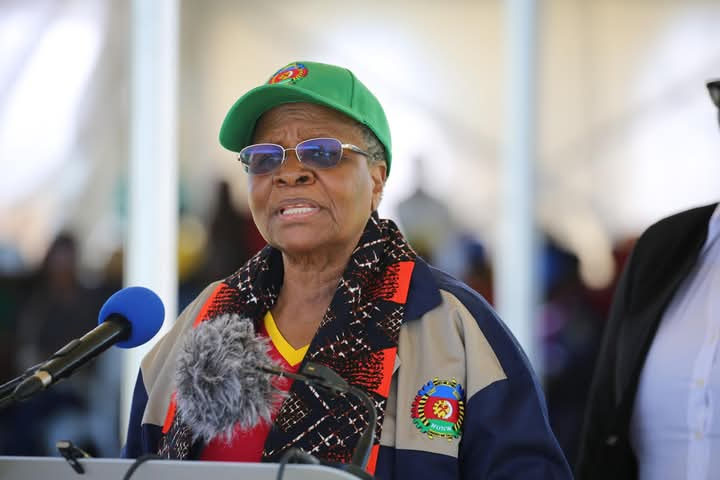In an era of increasing interconnectedness and interdependence, geopolitical risks have a critical influence on global perspectives and decision-making processes.
The Namibian government must proactively plan for the consequences of geopolitical risks to safeguard its national interests and economic stability.
The discoveries of oil and green hydrogen and an abundance of mineral resources present both substantial opportunities and challenges.
As a result, the government and its relevant stakeholders must incorporate the potential implications of geopolitical risks in their strategic planning to ensure sustainable development and economic stability.
The global geopolitical terrain has become increasingly composite, introducing a range of risks that can affect Namibia’s fragile economy.
However, with a strategic and forward-looking approach, we can unlock its economic potential while effectively navigating geopolitical risks.
Economists Dario Calder and Matteo Iacoviello noted that geopolitics describes the practice of controlling and competing for territory.
However, in recent decades, power struggles and other events involving a diverse set of agents – including corporations, non-governmental organisations, rebel groups and political parties – have also been classified as part of geopolitics.
Geopolitical risk refers to threats posed by wars, terrorist activities and tensions between states which disrupt the stability of international relations.
It encompasses both the likelihood of such events occurring and the risks associated with their escalation (Caldara and Iacoviello, 2018).
Against this background, let’s look at how Namibia can unlock its economic potential despite the geopolitical challenges posed by these events.
CONSEQUENCES
Namibia, like any nation, is not immune to the impact of geopolitical events. Former president Hifikepunye Pohamba once said, “Namibia is not an island. Our economy is intertwined in many ways with the global economy.”
Trade disputes, global economic fluctuations, wars, change of governments and shifting international alliances can have far-reaching effects on our economic stability.
One cannot dispute the unprecedented effect of the Russia-Ukraine crisis, the Israel-Palestine war, warring forces of Sudan, United States (US) president Donald Trump’s ‘America First’ drive, the civil war in the Democratic Republic of Congo, and potential political instability in Southern African Development Community (SADC) member states (such as Zimbabwe due to poor governance).
These are classic examples of geopolitical risks that Namibia confronts because we have historical and economic ties with these countries.
One of the crucial challenges we face is our dependence on commodity exports like minerals – such as uranium, diamonds, copper, etc – and import commodities such as petroleum products, pharmaceuticals, rubber etc, let alone agricultural and the blue economy products.
For example, Namibia’s leading economic sector, mining, accounts for 10% of Namibia’s gross domestic product (GDP) every year.
As the fourth largest exporter of non-fuel minerals in Africa and the world’s fifth largest producer of uranium, fluctuations in global demand and prices for these resources can negatively affect our revenue.
In addition, the rise of protectionist policies such as import tariffs and import quotas by the US and some other major economies can hinder Namibia’s trade prospects.
Geopolitical tensions in neighbouring regions such as the Economic Community of West African States and the East African Community can also indirectly affect our economic and social stability.
KEY STRATEGIES
To unlock its economic potential amid these geopolitical risks, Namibia can focus on several key strategies:
- Diversification: At independence in 1990, Namibia inherited an economy characterised by a narrow industrial base and heavy dependence on the production and export of primary commodities such as beef, fish and minerals.
Reducing dependence on a narrow range of commodities by diversifying the economy is crucial.
Namibia can invest heavily in sectors like tourism, agriculture, manufacturing, service and renewable energy sectors.
In this way, we can create a more resilient economy that is less susceptible to fluctuations in global commodity markets.
Regional collaboration: Namibia can leverage its position within the Southern African Customs Union (Sacu), SADC, SADC Protocol of Trade, African Continental Free Trade Area (AfCFTA), African Growth and Opportunity Act (Agoa), Economic Partnership Agreement (EPA), and the SADC Free Trade Agreement, to enhance regional cooperation.
Collaborative efforts can lead to improved trade relationships, infrastructure development, and shared security initiatives, which all contribute to greater economic stability.
- Infrastructure development: Investment in infrastructure, such as transportation networks (though Namibia is doing well in this area) and energy systems, can enhance our competitiveness.
Well-developed infrastructure not only facilitates domestic and international trade but also attracts foreign direct investment.
- Human capital: A skilled and educated workforce is a cornerstone of economic growth.
Namibia should invest more in hard sciences and vocational training to equip its citizens with the skills necessary to thrive in a modern economy.
We need skills to handle the logistical mass coming with oil and gas discoveries. This approach can also improve and facilitate innovation and entrepreneurship.
DIPLOMACY AND DEPENDENCY
While unlocking economic potential is paramount, Namibia must also effectively navigate geopolitical risks. These strategies include:
- Trade partnerships: Namibia should diversify its trade partners.
By reducing dependency on a single market such as South Africa, we can mitigate the impact of trade disruptions caused by geopolitical tensions.
- Strengthening diplomacy: Building and maintaining strong diplomatic relationships with key nations can provide Namibia with support and avenues for conflict resolution.
Open channels of communication can help manage and de-escalate potential geopolitical tensions.
- Preparedness: Developing a robust risk assessment and preparedness strategy can help Namibia anticipate and respond to potential geopolitical shocks.
Having contingency plans can minimise the negative impact of unexpected events.
- Sustainable Development Goals (SDGs): Aligning economic strategies with the United Nation’s SDGs can guide Namibia toward inclusive and sustainable growth. It can also enhance domestic stability and resilience.
In the final analysis, while Namibia has positively sustained regional and international engagements, it is imperative to adopt proactive measures to mitigate geopolitical risks.
This can be achieved through strategic diplomatic initiatives, diversifying trade partnerships, and enhanced preparedness to address potential disruptions.
Such efforts will enable Namibia to minimise the impact of external challenges, ensure long-term economic resilience and play an important role in promoting stability and prosperity in Africa and and beyond.
- Munyungano Musisanyani is a multidisciplinary columnist and food security activist with an interest in social justice and human relations; reaganmusisanyani@gmail.com
Stay informed with The Namibian – your source for credible journalism. Get in-depth reporting and opinions for
only N$85 a month. Invest in journalism, invest in democracy –
Subscribe Now!










